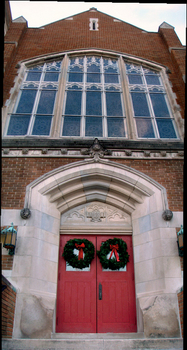Our Methodist Heritage
DePauw University’s origins and enduring identity are deeply rooted in the Methodist tradition, a rich history that has profoundly shaped its mission, values, and community life since its founding in 1837.
Founding and early history
DePauw University was established by the Methodist Episcopal Church and named initially Indiana Asbury University, in honor of Francis Asbury, the first American bishop of the Methodist Episcopal Church. This founding was not merely a coincidence of faith but a purposeful response to the religious and educational landscape of early 19th-century Indiana. At that time, Indiana’s primary public university, then known as Indiana College (now Indiana University), was dominated by Presbyterian leadership and faculty. Methodists, who sought representation and influence in higher education, found their efforts to secure faculty positions unsuccessful. This rejection galvanized Methodist leaders to create their own institution—one that would reflect their values and educational philosophy.
From its inception, DePauw was more than a denominational college. The founders articulated a bold and inclusive vision: the university would be “forever conducted on the most liberal principles, accessible to all religious denominations, and designed for the benefit of our citizens in general.” This commitment to openness and ecumenism was progressive at its founding and has remained a defining characteristic of DePauw’s identity.
Methodist values and educational philosophy
The Methodist tradition has long emphasized education as a vehicle for personal transformation and social betterment. This perspective is evident in DePauw’s ongoing dedication to fostering intellectual rigor, moral reflection and civic responsibility. The university’s founders believed that education should cultivate not only knowledge but also character, encouraging students to lead lives of service and ethical leadership. This commitment ensures that students are not only intellectually stimulated but also morally grounded.
Throughout its history, DePauw has embodied these ideals by promoting a liberal arts education that integrates academic inquiry with spiritual and ethical development. The university’s Methodist heritage has influenced its commitment to inclusivity, justice and community engagement, encouraging students to explore diverse perspectives while cultivating values of compassion and integrity.
Evolution and inclusivity
DePauw’s Methodist roots are foundational. As the United Methodist Church has evolved, the university has also changed to embrace a broader community. DePauw was a coeducation pioneer, admitting women as early as 1867, reflecting Methodist support for educational access regardless of gender. In alignment with the Methodist teachings, the university has welcomed students from all religious, cultural and socioeconomic backgrounds, fostering an environment of pluralism and mutual respect.
This inclusive spirit aligns with the Methodist emphasis on grace and outreach and the university’s original charter to serve “all religious denominations.” Today, DePauw continues to honor this legacy by supporting a vibrant spiritual life on campus that includes multiple faith traditions and interfaith dialogue.
Ongoing methodist affiliation and partnerships
DePauw maintains a strong and active relationship with the United Methodist Church, particularly through its partnership with the Indiana Conference. This connection is reflected in many aspects of campus life, governance and spiritual development:
- Accredited United Methodist University: DePauw is officially recognized as an accredited United Methodist university, affirming its commitment to the values and educational standards of the denomination.
- Board of Trustees Representation: The Bishop of the Indiana Conference of the United Methodist Church serves as an ex officio member of DePauw’s Board of Trustees, ensuring a direct and ongoing link between the university and the church’s leadership.
- Spiritual Life and Ministry: DePauw’s Office of Spiritual Life is co-located within the historic Gobin Memorial United Methodist Church, situated adjacent to campus, the Center for Spiritual Life in the Bartlett House, and the Bartlett Reflection Center located at the DePauw Nature Park. This unique arrangement fosters daily collaboration between the university and Gobin church, providing a welcoming space for worship, reflection and interfaith engagement.
- Methodist Chaplaincy: The university’s chaplain is an ordained Methodist minister, offering spiritual guidance, pastoral care and leadership for worship and service initiatives rooted in the Methodist tradition, while also supporting students of all faiths and backgrounds.
- Archives and Historical Stewardship: DePauw houses the Archives of Indiana United Methodist Church, a vital repository preserving the history of the university and the United Methodist Church in Indiana. This partnership between the university and the Indiana Conference ensures the preservation and accessibility of Methodist heritage for scholars, church members and the public.
- Community Engagement: The university’s Methodist heritage informs its commitment to community impact initiatives such as the work of the Hartman Center for Civic Engagement, the Bonner Scholars Program, and the Winter Term in Service programs, fostering a culture of active citizenship and ethical responsibility.
Through these ongoing affiliations and partnerships, DePauw continues to honor its Methodist roots by serving as an inclusive and dynamic center for academic and spiritual life
A living tradition
DePauw’s Methodist heritage is not merely historical; it is a living tradition that continues to inspire and guide the university community. The values of inclusivity, service, moral reflection and academic excellence remain central to DePauw’s mission. By embracing its Methodist teachings while welcoming diverse perspectives, DePauw fosters a dynamic environment where students are prepared to engage thoughtfully and compassionately with the complex challenges of the modern world.
Contact Us

- 765-658-4615
-
411 E. Seminary St.
Greencastle, IN 46135
